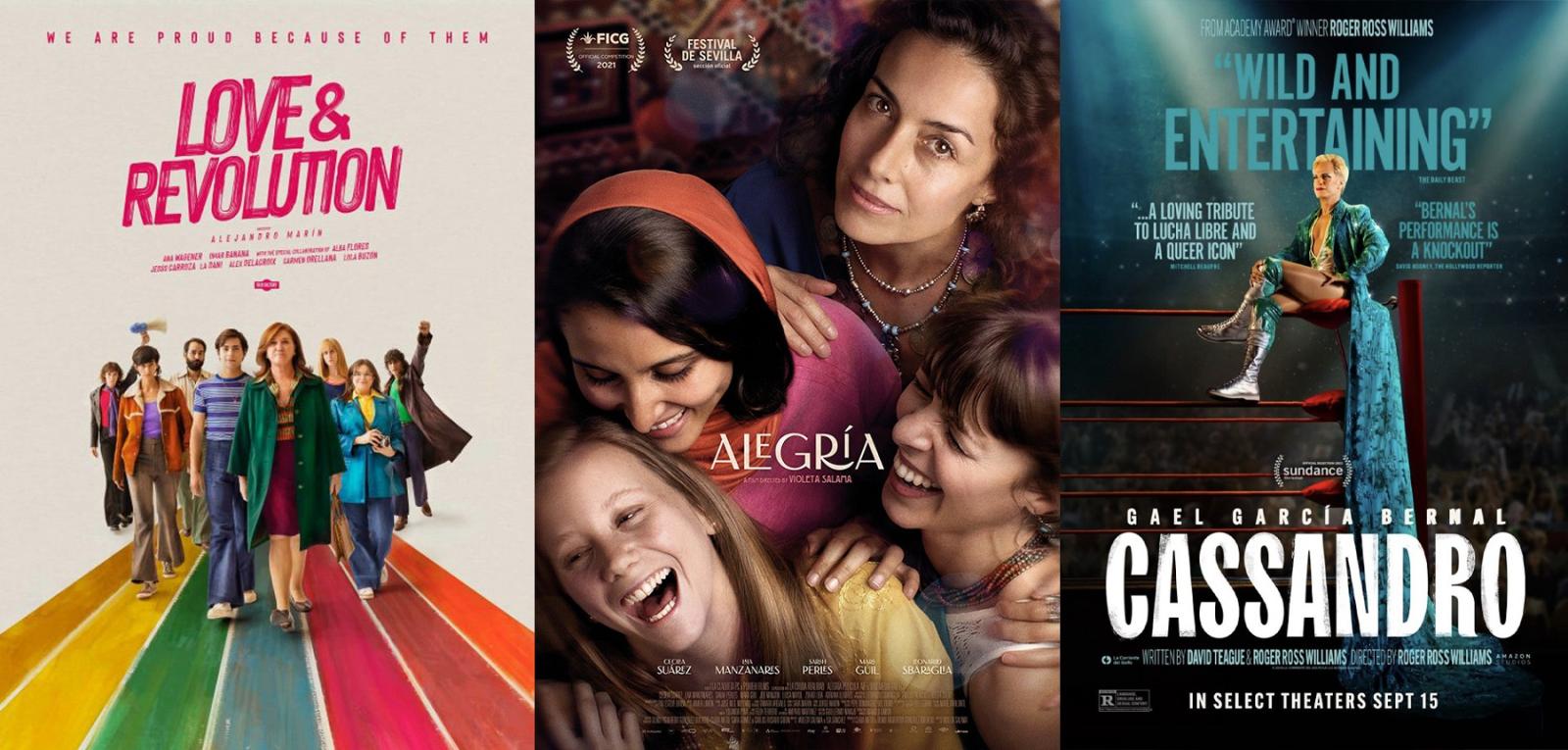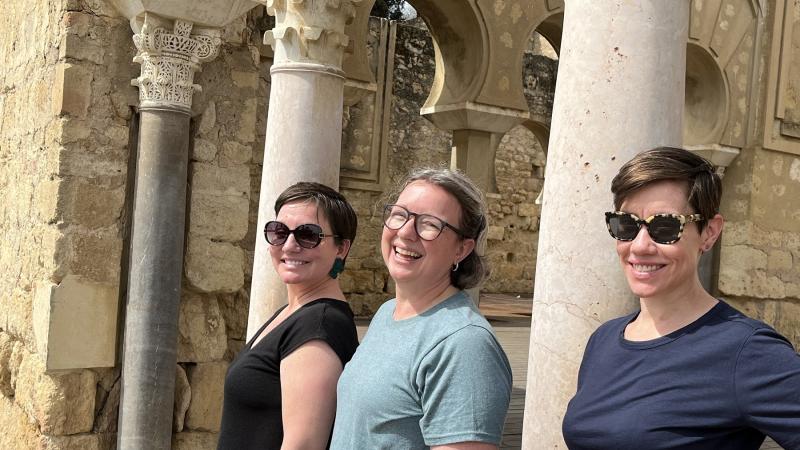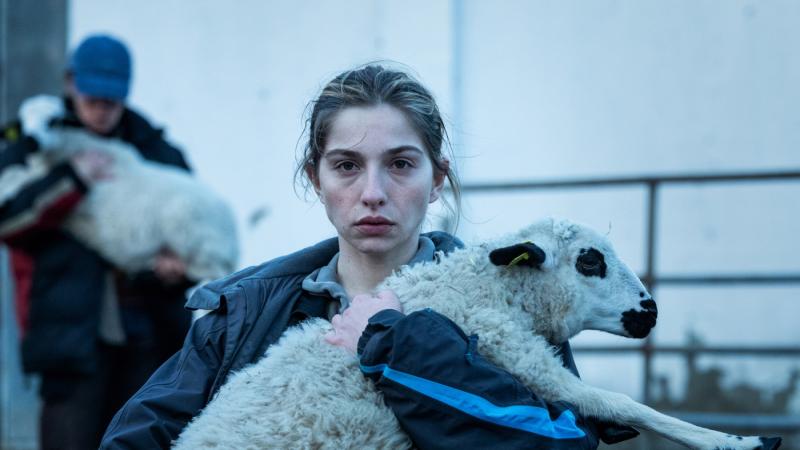The Latin American and Spanish Film Festival, held annually at Lawrence University since 2012, returns for three days in early October. Five films will be shown in the cinema in Warch Campus Center Oct. 4-6.
Rosa Tapia, professor of Spanish, said she and her co-organizer, Cecilia Herrera, instructor of Spanish, are thrilled to again bring the film festival to campus.
“Featuring recent award-winning films from around the Spanish-speaking world, the festival highlights exceptional storytelling and addresses critical social issues, such as mental health awareness, LGBTQ+ experiences across the globe, and cultural and religious coexistence,” Tapia said.
The film festival is an independent event with sponsorship from the Department of Spanish, Latin American and Latinx Studies, the Global Languages and Cultures Coalition, and the Siekman Foundation.
Conversation and culture combine in the Spanish program at Lawrence.
Tapia said she and Herrera are especially excited to welcome director Juliana Maité, who will discuss her film, Without Prescription (2023), with the audience on Oct. 4. Participants will engage directly with the filmmaker.
“Since its inception in 2012, the festival has become a beloved tradition, eagerly anticipated by students, colleagues, and the local community,” Tapia said. “Many attendees consider this festival a highlight of their year. We believe it will entertain, educate, and engage our audience, fostering a more inclusive and connected community.”
Admission is free; the films are in Spanish language with English subtitles.
Films being shown include:
Without Prescription (Receta No Incluida) (2023)
Director: Juliana Maité; Puerto Rico; 5 p.m. Oct. 4
- This film follows Olivia, a young woman suffering from obsessive-compulsive disorder (OCD). Set on Christmas Eve, Olivia’s condition isolates her from her family and society. Her low-paid teaching job doesn’t provide health insurance, forcing her to seek medication through unconventional means. She meets David, a pharmacist who sells prescription medication clandestinely. A storm forces them to spend time together, leading to a transformative experience for both. The film has been praised for its honest portrayal of mental health issues, particularly OCD. It sheds light on the daily struggles of those with mental health conditions and challenges common misconceptions. The film will be followed by a Q&A and reception with Maité. The discussion will provide insights into the film’s themes and encourage meaningful conversations about trauma, mental health, social inequity, and access to medical care.
The Eternal Memory (La Memoria Infinita) (2023)
Director: Maite Alberdi; Chile; 2 p.m. Oct. 5
- This documentary follows the life of Augusto Góngora, a Chilean journalist and cultural commentator, and his wife, Paulina Urrutia, as they navigate his battle with Alzheimer’s disease. The film focuses on the concept of memory, both personal and collective, and how it shapes our identities. The film has been lauded for its delicate and lyrical approach to a deeply emotional subject. It balances personal reflection with historical consciousness, making it a poignant exploration of memory and loss.
Love and Revolution (Te Estoy Amando Locamente) (2023)
Director: Alejandro Marín; Spain; 4 p.m. Oct. 5
- Set in Seville in 1977, this film follows Reme, a traditional mother, who becomes involved in the LGBTQ+ movement to support her son, Miguel, who aspires to be a singer. The film explores the challenges and triumphs of the LGBTQ+ community during a time when homosexuality was criminalized. The film has been praised for its heartfelt portrayal of a mother’s love and the fight for LGBTQ+ rights. It combines humor and tragedy to highlight the social changes of the time, making it both an inspiring and entertaining watch.
Cassandro (2023)
Director: Roger Ross Williams; Mexico; 2 p.m. Oct. 6
- This biopic tells the story of Saúl Armendáriz, a lucha libre wrestler who finds success as an exótico, a male wrestler who performs in drag. Saúl, known as Cassandro, breaks barriers in the macho world of Mexican wrestling, becoming a national sensation. The film has been celebrated for its portrayal of a queer hero in a traditionally homophobic sport. Gael García Bernal’s performance as Cassandro has been particularly praised for its depth and authenticity.
Alegría (2021)
Director: Violeta Salama; Spain; 4 p.m. Oct. 6
- The film centers on Alegría, a woman who has distanced herself from her Jewish heritage. Living in Melilla, a city where Christian, Jewish, and Muslim families coexist peacefully, Alegría must reconcile with her past and her family to find peace. Alegría has been noted for its beautiful depiction of cultural and religious coexistence. The film’s setting in Melilla and its focus on small, human moments have been highlighted as its strengths.



